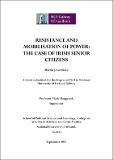| dc.description.abstract | In October 2008, the Irish pensioners engaged in nation-wide public campaign of dissent in response to the government decision to abolish the universal access to medical card for the over-70s, which culminated in the largest public demonstration Ireland had seen in decades and forced almost complete reversal of the policy. Using the event as empirical case, the thesis focuses on the problem of resistance, the exercise of social and political power by disempowered groups in the face of existing power structures and following pages present theoretically-driven sociological investigation of the operation of power in the context of this ‘Silver Revolution’.
The OAPs resistance is interpreted as reaction triggered in response to government decision to target a universal benefit. This was perceived by the OAPs as unforgivable violation of social contract which undermined their practical understanding of their symbolic position in Irish society, thus disrupting their sense of ontological security they derived from it. The success of the protests will be discussed in terms of the confluence between several factors. The importance of the benefit to for the OAPs’ everyday functioning. Discrepancy between the government decision and the public perception of the OAPs status in terms of the relationship to the state which resonated strongly with OAPs’ own understanding and helped to build up momentum for public support. Capacity of OAPs and OAP NGOs to come up with a coherent counter-narrative to government discourse and mobilise a public response extent, speed, and severity of which has not been seen in Ireland in decades.
The thesis locates its contribution to knowledge in three ways. Empirically, drawing upon wide array of data the thesis provides both factual and experiential accounts of the event. Thus, expanding the, scarce but growing, body of literature about the pensioners’ protests in Irish social science. Theoretically, it seeks to re-activate the foundations of Mark Haugaard’s four-dimensional model of power rooted in the theory of (re)structuration. And to apply this lens to interpretation of the old age pensioners resistance. And, methodologically, the thesis makes a theoretical case for the inclusion of the Interpretative Phenomenological Analysis, into the methodological repertoire of interpretive sociology in general, and four-dimensional model in particular. | en_IE |


